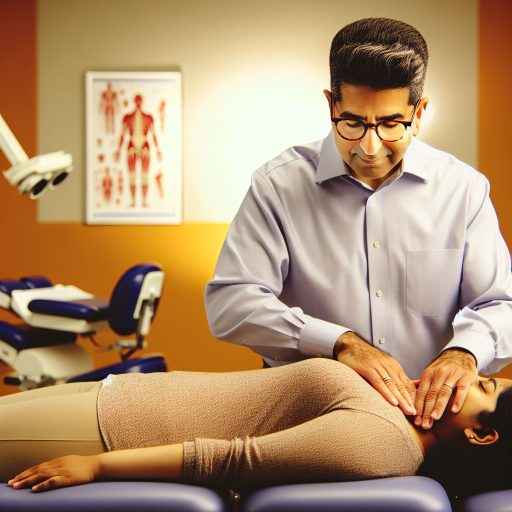Research the Role and Responsibilities of an Audiologist
Understanding the Audiologist’s Role
An audiologist specializes in diagnosing hearing disorders.
They assess and manage hearing and balance issues.
Audiologists conduct various tests to evaluate auditory functions.
They also fit and dispense hearing aids and other devices.
Clinical Responsibilities
Audiologists provide comprehensive audiological evaluations.
They develop individualized treatment plans for patients.
Furthermore, they offer counseling to patients and families.
They collaborate with medical professionals to ensure holistic care.
Public Health and Advocacy
Audiologists work on community outreach programs to raise awareness.
They often participate in hearing conservation initiatives.
Additionally, they advocate for better hearing health policies.
Continuing Education and Professional Development
The field of audiology requires ongoing education.
Audiologists participate in workshops and training sessions to stay updated.
They often join professional organizations to network and learn.
Applying Specialization Areas
Audiologists may specialize in pediatric audiology or geriatrics.
They can also focus on rehabilitation or research in hearing sciences.
Each specialization involves unique skill sets and knowledge bases.
Complete a Bachelor’s Degree in Communication Sciences or Related Field
Importance of Education
Education plays a vital role in becoming a certified audiologist.
A bachelor’s degree provides foundational knowledge in communication sciences.
This degree enhances your understanding of human hearing and speech processes.
Moreover, it prepares you for advanced studies in audiology.
Choosing the Right Program
Select an accredited program to ensure quality education.
Look for universities with strong communication sciences departments.
Consider programs that offer hands-on experience in audiology.
Networking with faculty can provide insights into the field.
Unlock Your Career Potential
Visualize a clear path to success with our tailored Career Consulting service. Personalized insights in just 1-3 days.
Get StartedCore Coursework and Skills Developed
Expect to take courses in anatomy and physiology of the ear.
Language development and speech science are also essential subjects.
Additionally, courses in acoustics will be beneficial.
These subjects will foster critical skills needed in audiology.
Extracurricular Opportunities
Engage in internships to gain practical experience.
Join student organizations related to communication sciences.
Attending conferences can also expand your knowledge and network.
Such experiences will strengthen your application for graduate school.
Preparing for Graduate School
Maintain a strong academic record throughout your undergraduate studies.
Seek opportunities for research and independent studies.
These experiences will enhance your graduate school applications.
Additionally, consider preparing for entrance exams, if required.
Pursue a Master’s or Doctoral Degree in Audiology (Au.D.)
Understanding the Degree Requirements
To become a certified audiologist, you must earn an advanced degree.
An Au.D. prepares you for the challenges of the profession.
This degree focuses on clinical practice and patient care.
Typically, programs last four years after completing an undergraduate degree.
Courses will cover audiology theory, research, and clinical skills.
Selecting an Accredited Program
Choose a program accredited by the Council on Academic Accreditation.
Accreditation ensures the quality and credibility of the education you receive.
Research potential schools before making your final choice.
Consider the faculty’s expertise and the program’s reputation.
Additionally, look for programs offering hands-on clinical experiences.
Completing Clinical Practicum
Most graduate programs require a clinical practicum.
This experience allows you to apply your knowledge in real-world settings.
Working under licensed audiologists will enhance your learning.
Prepare to log several hours of supervised clinical practice.
This component is crucial for developing your patient interaction skills.
Preparing for National Certification
Upon graduation, you’ll need to pass the national certification exam.
This exam evaluates your knowledge and competency as an audiologist.
Study diligently, using available resources and review materials.
Consider joining study groups with peers to enhance your preparation.
Successfully passing the exam is a significant step towards certification.
Gain More Insights: Benefits Of Pursuing A Career In Speech Pathology
Gain Practical Experience Through Supervised Clinical Hours
Importance of Supervised Clinical Hours
Supervised clinical hours are essential for aspiring audiologists.
This experience enhances both skills and knowledge in audiology.
Moreover, it provides an opportunity to apply theoretical concepts.
Where to Obtain Clinical Hours
Seek accredited audiology programs that offer clinical placements.
Many universities partner with local clinics for this purpose.
Additionally, consider volunteering at healthcare facilities.
Structured Mentorship
Work with experienced audiologists during your clinical hours.
A mentor can guide your development and provide valuable feedback.
They will help you refine your clinical skills and decision-making.
Document Your Experience
Keep a detailed log of your supervised clinical hours.
Include the types of cases you handled and your specific roles.
This documentation will be vital for certification applications.
Reflect on Learning Experiences
Take time to reflect on your clinical experiences regularly.
Identify areas for improvement and adjust your learning strategies accordingly.
Reflection fosters continuous growth throughout your training.
Delve into the Subject: Audiologists And The Connection To Overall Wellness
Pass the National Examination in Audiology
Understanding the Exam Requirements
The national examination evaluates your knowledge and skills in audiology.
It consists of multiple-choice questions covering various topics.
These topics include anatomy, physiology, and audiometric assessment.
Moreover, it assesses your understanding of ethical practices and professional standards.
Preparing for the Exam
Begin your preparation by reviewing the exam’s content outline.
Gather study materials, such as textbooks and online resources.
Consider enrolling in a review course for structured support.
Additionally, join study groups to enhance your understanding.
Practicing with Sample Questions
Access sample questions to familiarize yourself with the exam format.
Practice regularly to identify areas needing improvement.
Consider timing yourself to simulate actual exam conditions.
Registering for the Exam
Register for the exam through the official audiology association’s website.
Be aware of registration deadlines to avoid last-minute issues.
Choose a convenient testing location and date that suits you.
Exam Day Tips
Arrive at the exam center early to reduce stress.
Bring necessary identification and any required materials with you.
Stay calm and focused throughout the exam.
Answer questions to the best of your ability, marking those you’re unsure about for later review.
Find Out More: Importance Of Audiologists In Pediatric Care

Obtain State Licensure to Practice as an Audiologist
Understand the Licensure Requirements
Each state has specific licensure requirements for audiologists.
Typically, these requirements include educational credentials and supervised clinical experience.
Familiarize yourself with your state’s licensing board regulations.
Research the specific exams required for licensure in your area.
Complete the Necessary Education
A doctorate in audiology is generally required to become licensed.
This degree must be obtained from an accredited institution.
Be sure your education includes extensive coursework in audiology.
Participating in clinical rotations will enhance your practical skills.
Pass the Required Examination
Most states require the passing of the Praxis Examination in Audiology.
Prepare thoroughly for this examination by reviewing relevant materials.
Consider enrolling in a preparation course if necessary.
Submit Your Application
Once qualified, submit your application to your state’s licensing board.
This application generally includes proof of education and exam results.
Pay close attention to details when completing your application.
Ensure you meet all deadlines set by the licensing board.
Maintain Your Licensure
After obtaining licensure, you must maintain it through continuing education.
Most states require a certain number of continuing education units every few years.
Stay updated on changes in regulations and best practices in audiology.
Engage in professional organizations for resources and networking opportunities.
Learn More: Building Client Relationships As A Speech Pathologist
Consider Obtaining Certifications from Professional Organizations
Importance of Certifications
Certifications validate your expertise and commitment to the audiology field.
They enhance your professional credibility among peers and clients.
Moreover, certifications signal compliance with industry standards.
Employers often prioritize certified candidates during the hiring process.
Popular Professional Organizations
The American Speech-Language-Hearing Association (ASHA) stands out in the field.
ASHA offers a Certificate of Clinical Competence in Audiology.
Obtaining this certification boosts your job prospects significantly.
Additionally, the Academy of Doctors of Audiology (ADA) is another option.
ADA’s certifications emphasize advanced clinical practice and knowledge.
Many audiologists pursue both ASHA and ADA credentials for breadth.
Steps to Obtain Certification
Firstly, ensure you meet the educational requirements set by ASHA.
This typically includes a doctoral-level degree in audiology.
Next, complete your supervised clinical practice hours.
This hands-on experience is crucial for qualification.
Afterward, pass the required national examination in audiology.
Success in this exam demonstrates your professional competency.
Finally, apply for your certification through the respective organization.
Be prepared to maintain your credentials through continuing education.
Continuing Education and Shared Resources
Stay updated with the latest research and techniques in audiology.
Participate in workshops and seminars to enhance your skills.
Many organizations offer resources for ongoing education.
Networking with other audiologists can provide valuable insights.
Consider joining forums and professional associations for support.
Pursue Continuing Education to Maintain Certification and Stay Updated in the Field
Importance of Continuing Education
Continuing education is vital for audiologists.
It enhances knowledge and skills in a rapidly evolving profession.
New technologies and techniques emerge regularly.
Staying current benefits both audiologists and their patients.
Types of Continuing Education
Audiologists can choose various education formats to pursue.
Attending workshops and conferences offers hands-on experience.
Online courses provide flexibility and convenience.
Additionally, seminars allow for networking with peers.
Consider formal education programs for deeper learning.
Sources of Resources
Many organizations offer resources for continuing education.
The American Academy of Audiology provides numerous opportunities.
State licensing boards often approve specific courses.
Professional journals publish valuable research and findings.
Online platforms like Coursera and edX offer diverse courses.
Creating a Personal Development Plan
Developing a personal development plan is essential.
Identify specific goals and areas for improvement.
Allocate time for professional development each year.
Seek feedback from colleagues to continuously improve.
Adjust your plan to adapt to changes in the field.
Tracking Professional Development
It’s important to track your educational progress regularly.
Maintain records of completed courses and certifications.
Review your goals periodically to assess growth.
Establish milestones to stay motivated throughout your journey.
Consider sharing your achievements with peers or mentors.
Additional Resources
Doctor of Audiology Program | MGH IHP
Telepractice in Audiology: Supporting Clinical Implementation …




